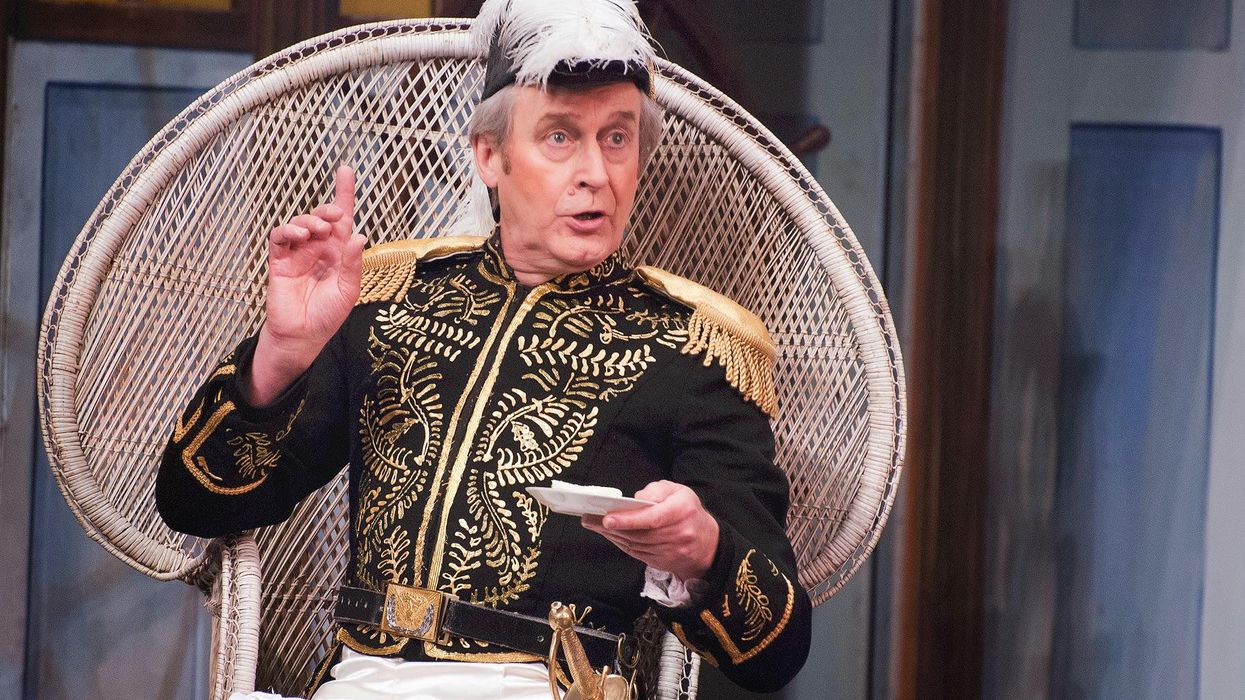For His Curtain Call, Beloved Director Stages Comedic Opera at the Hobby Center

SUMMER IS A time for lightening up — and the performing-arts community has taken note.
On July 30-31, at Zilkha Hall, Hobby Center for the Performing Arts, the Gilbert and Sullivan Society of Houston presents H.M.S. Pinafore, one of W.S. Gilbert and Arthur Sullivan’s most enduring and entertaining comic operas. The performances will be the last for the Society’s beloved stage director, featured performer and expert on all things Gilbert and Sullivan, Alistair Donkin.
Donkin — a longtime member of the London-based D’Oyly Carte Opera Company, which was created in 1875 to produce and present Gilbert and Sullivan’s repertoire — was contacted by the Society in 1982 to sing in their 30th-anniversary performance of Trial by Jury. “I was nominated, and I came over, and I’ve been coming back ever since,” says Donkin.
Even if you think you’ve never heard a Gilbert and Sullivan song, you probably have, as the music and lyrics of the Victorian era hold the distinction of being ripe for comedic appropriation. (In a bizarre episode of The Simpsons, Bart tries to delay being killed by the maniacal Sideshow Bob by asking him to sing the entire score to H.M.S. Pinafore.)
Donkin attributes Sullivan’s compositional skill as key to the timeless appeal of the operas. “You come out singing the tunes, not humming the scenery,” says Donkin. “You cannot get these tunes out of your head.”
The duo’s unique combination of humorous lyrics, sung in a rapid-fire style known as “pattering,” and Sullivan’s memorable tunes became a bridge between the European opera tradition and the modern-day American musical. Gilbert and Sullivan operas also address social issues that in many cases are still relevant today. “Gilbert was a satirist,” explains Donkin. “So beneath all the froth and enjoyment and fun, there is a biting social comment.”
Historical references abound in a Gilbert and Sullivan opera, so much so that 45 minutes before each performance of H.M.S. Pinafore, there will be a presentation explaining some of the opera’s more obscure subtexts. The opera’s regal and ridiculous Sir Joseph Porter, for instance, was based on the real life W.H. Smith, a member of the government of Prime Minister Benjamin Disraeli, and known by the inner circle of the government to be gay. “He surrounded himself with female relatives, which is exactly what Gilbert has done with Sir Joseph Porter with his sisters and cousins and aunts,” says Donkin. “Take any phrase in a Gilbert and Sullivan opera, Google it, and you’ll find a fascinating history about that single phrase.”
The Zilkha Hall performances will be bittersweet for Donkin, and when asked what he’ll miss most about Houston, the response is immediate. “My friends,” says Donkin, who mentions the late bass-baritone Ralph L. Katz, who appeared in several productions by the Society. “Ralph and his wife flew to England when my partner and I had our civil partnership,” says Donkin. “He was a cantor in one of the Houston synagogues, and at the ceremony, he sang a blessing a cappella in Hebrew for us.
“That’s the sort of friend I’m going to miss,” says Donkin. “Thank God for Skype and Zoom, otherwise I would never see them!”














 Frederica von Stade (photo by Michelle Watson)
Frederica von Stade (photo by Michelle Watson)


 Jonathan and Ann Ayre and Rachel and Warren Ellsworth (photo by Michelle Watson)
Jonathan and Ann Ayre and Rachel and Warren Ellsworth (photo by Michelle Watson)








 Tiffany Sebastian, Kristin Bingham and Amanda Abiassi (photo by Dave Rossman)
Tiffany Sebastian, Kristin Bingham and Amanda Abiassi (photo by Dave Rossman)